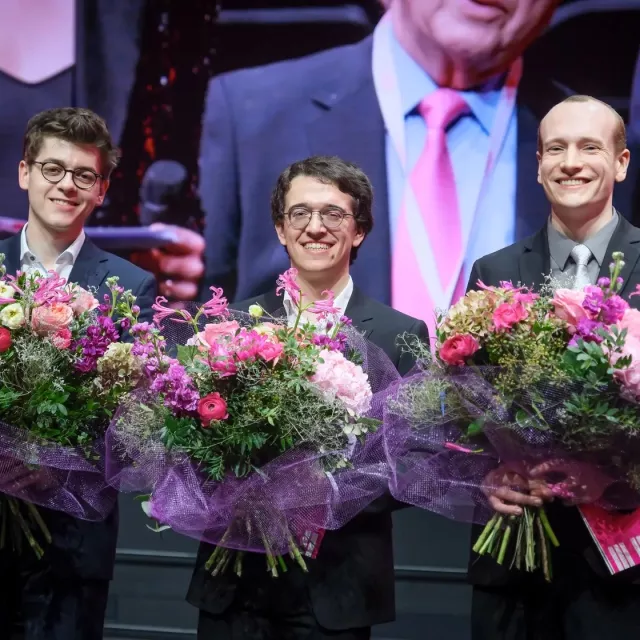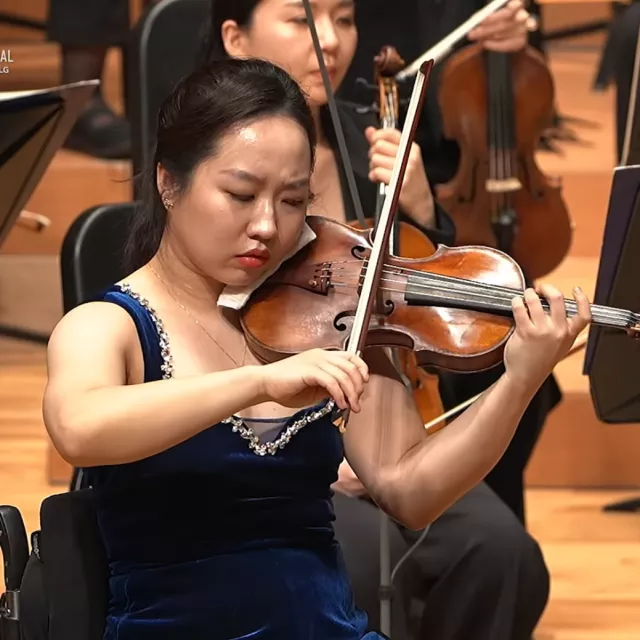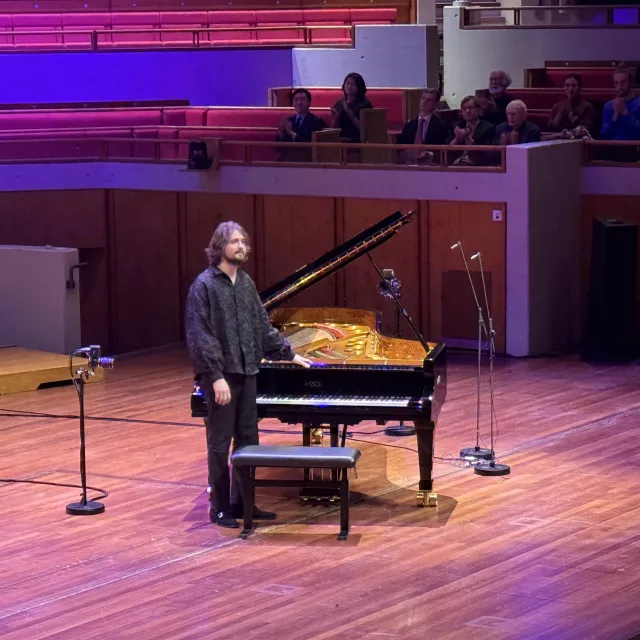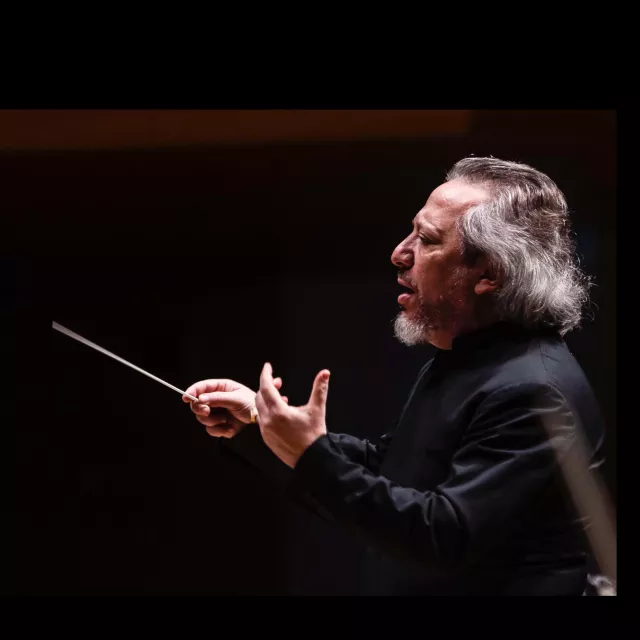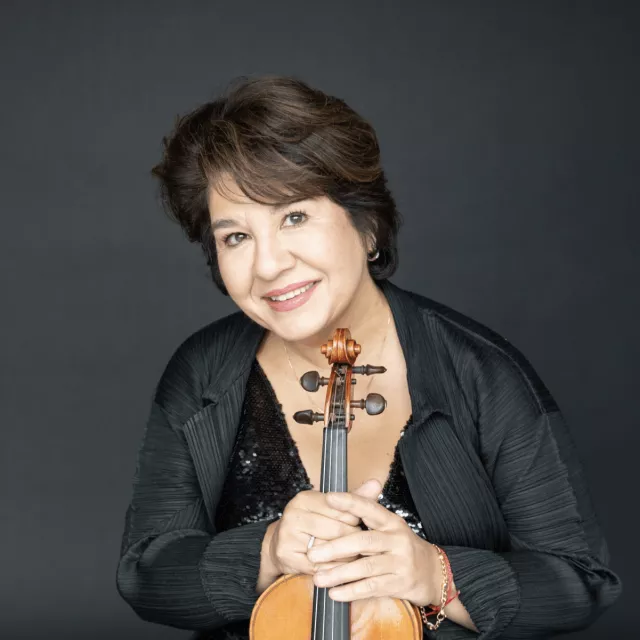Music in the DNA

After 11 years at the helm of the Concours de Montréal, Christiane LeBlanc will leave the competition this May
WFIMC: You started in your job over 10 years ago, in 2012. What was it like when you first came to the competition?
Christiane LeBlanc: The first year brings back very interesting memories because when I arrived in September for the competition (which was going to be held in the spring) the jury wasn't complete, but Maxim Vengerov was supposed to be on the jury, and he was supposed to do only the finals. Then, as I went along, I realized that other jury members didn't really like that idea. It was a big problem, but I didn't have a conductor for the orchestra, so I ended up convincing Vengerov to conduct instead of being on the jury. It was fun! We did a lot of exciting things with him.
You wanted the competition to be seen more as a festival…
I think we developed the festival idea as much as we could- considering the financial situation- and organized all kinds of extracurricular activities. When I arrived at the competition, I found a very well thought-of competition. I have to say that the two co- founders, André Bourbeau and Joseph Rouleau, along with my predecessor Jacques Marquis, did a fabulous job. The rules and regulations, and the whole context of what is a competition, didn't really need my input. It didn't really need a lot of changes. But I felt that we could be creative and try to attract more audience and more attention, so, for example, we did things like sing-alongs, when there was a voice competition. We did a sing-along of Sound of Music, the whole soundtrack, with the competitors.
It was important for me that all the competitors do something together in the beginning of the competition: sing together, play together. It changes their competitive attitude right away. When they arrive, they are all a bit shy, they´re just thinking of their program, and all of the sudden they have to get out of that shell and share a score with someone else. This is something very nice we did with voice, piano and violin.
Then, we added elements like an improvisation prize for piano editions, and a younger component, the “Mini Violini”, which we are doing again this spring. We felt that it would be important to connect with very young violinists, because when they are 12 years old, we know that four years later, they could become a contestant in our competition. In fact, one of our “minis” from 2018 has just been chosen for the upcoming violin competition. We didn't cheat! He was selected by the preliminary jury, so I'm very happy about that.
But besides these projects, the core of the competition stayed the same?
What we tried to do is to build a larger community around the competition. I find that this is so, so important. Whether you're in Europe, North America or Asia, I would suspect it's the same situation because it's a community that we manage to build: not just the donors, but also the host families, the volunteers, the friends. In Montreal, each competitor is sponsored now. Each jury member is sponsored. Our conductor is sponsored. We sponsor a lot because we need the money, but at the same time it creates links. We have these business people who all of a sudden feel a little more interested in coming because they're actually sponsoring one of the jury members and so they want to meet them. We have really developed and solidified this community of support on many different levels. And now that I am leaving, I feel that this community is very solid and should just follow through, and not be linked to the person who is the executive chair.
Over the years, the competition has gained a really great reputation around the world. When you look back at all these editions, which one was the most memorable for you? Are there any artists, any performances that stand out?
There's always performances and moments that stand out. But I have to say that probably the most exciting addition we did in the past 10 years was when we changed our voice edition format in 2018. We decided to separate opera and art song and created two equal divisions. I think this was a first in competitions throughout the world, to give the prizes an equal weight. If we had a first prize of, let's say, $50,000 in opera, it would be the same for art song. This I haven't really seen anywhere else. And it was special because somehow we just managed to create a lot of buzz around this new format. I remember our jury members being absolutely stunned that we had a full house for the first day of an Art Song session, which is not necessarily the most popular with audiences. What´s more, it also helped us to create links with donors outside of Montreal. For example, we were supported by a Toronto community for this Art Song component. I think for me, that was a turning point in the competition. I started thinking of doing this when I realized that we were asking too much of our singers. You can't sing Wagner and Debussy at the same time and be good at both. It's about your type of voice, it's about your personality, it's about stage presence. It's very different. I felt we were really being fair and giving the singers the ideal platform for their personality and their type of voice.
Would this not be a motivation to move away from violin and piano, and focus entirely on voice?
I can't predict the future, but there are signs. For example, we're doing violin this spring, but in '24, we're going back to voice already, and we did voice just last year. In the beginning of the competition (I'm talking 20 years ago) voice was happening every two years. So you'd have voice, piano, voice, violin. Then it became more regular, the three disciplines. We are going back to the old system now because we´ve realized that there´s a lot more excitement around our voice competitions, for some reason.
Voice is more popular than piano and violin?
First of all, we have more Canadians participating. There's something in Canadian water, I think, which creates really beautiful voices. A lot of singers have wonderful careers in Europe and the States who are Canadian. We always get more competitors, and they also attract more audience, more buzz. And in turn, it pleases our sponsors because they like some of their money to stay at home. I think it's really in the DNA of Montreal, of Quebec, maybe even Canada, that we're singers more than anything.
We're a very young country. In the past, Quebec was a rather poor province and you didn't have instruments. You maybe had an old piano in the corner, but everybody could sing, and so it became part of our culture. It was free! And so, many songs were handed on from generation to generation.
Again, voice is very close to our DNA and that's probably why that discipline seems to have the favors of most people in our community.
On a different note, if you look at the graphics, there is an enormous amount of piano competitions everywhere in the world. And there's a lot of violin competitions. But there's actually not that many international voice competitions. Maybe we should consider this in the future. Maybe the CMIM would find a more focused place in the world of competitions if we focused on voice only. But I will leave that to my successor to develop.

Then again, you had some rather outstanding winners in piano and violin.
I know. But you can't please everybody in life. I'm not saying we're abandoning piano and violin. I'm just saying that we started a strategic planning exercise about eight months ago. It's still going on. But because of my departure, we will wait for whoever will take my place to sit down and analyze all this, keep the reflections going and in the end make a final decision on what the future of the competition will be. I mean, if I was 25 years younger, I would jump at this opportunity to develop a new format for the competition. But I believe it's time for someone else.
You have a piano and musicology background, and you worked for a long time at the radio. How did you actually get to the competition?
I think that if I look back at 25 years in broadcasting, and now more than 10 years of working for the competition, I would say my biggest personal victory is that I always managed to work in music, even though I was very much in management. I started as a music producer, recording producer, and did pretty much everything else at the broadcasting corporation. Rather quickly, I became a manager. I went on the management side and they tried to get me for the news or for some other department, but I always insisted on staying in music because that was my thing. I had a master's degree in music. My mother was a singer. My younger sister is a professional singer. Music was so part of my life and I am so happy that I didn't just follow this „climbing the ladder“ at any cost. I could have ended up as head of news or head of God knows what at the broadcasting company, but I insisted to stay in music. Still, after 25 years, I really felt that I had been around and I'd done pretty much everything I could do at the company. I was actually thinking of retiring right then and there. Or, at least „half retiring“. Then it was a matter of coincidence that Jacques Marquis was leaving and they asked: “Would you be interested?” In the beginning I thought it would be a side job, to be honest. A fun little project on the side. I thought I would do three years. One cycle, and then I would be off. But then I thought: oh, wow, what a surprise! It´s a whole big world in itself, a lot of work, and I just loved it. And I stayed there for more than 10 years.
Looking back, I think this music link in my whole career is perhaps what pleases me the most. I didn´t betray myself for ambitious reasons, I followed my heart and stayed close to music. Moreover, I had developed many different initiatives aimed at young talent, at discovering and nurturing young talent. So when the competition job came up, it seemed perfectly natural to continue on an international level what I had been doing at the broadcasting. Music Making, music loving, and music management- there is a link in these whole 37 years or so of my career.
Did you ever want to be a musician?
Well, I have a bachelor in piano, but there are a lot of pianists in the world, and I realized that I would never be a Beatrice Rana, for example, so I veered to musicology for my Master´s degree. Then I needed a summer job and was hired by the broadcasting company as a host. Later, when I finished my Master´s, they hired me as a producer. Actually, I very rarely did an interview for a job- I was very lucky and just fell into them somehow.
What will you be doing once the 2023 competition is finished?
Well, you do want to have a break. I will stay on the board of the foundation, which means I will know what´s happening at the competition, but I don´t want to be part of the decisions. I think it´s better to just let somebody spread their wings and fly off to develop their own view. It´s a very important job to be an artistic and executive director.
I've actually been linked to this competition for over 20 years in a very serious way. It would be hard to totally ignore them from now on. But I will spend a lot more time traveling. We just bought a place in Florida, because Canadian winters are not that fun anymore. I put my skis away and I've traded them for golf clubs and I love it. Anyway, I'm giving myself a year of free time and after that, perhaps some consulting, perhaps some boards. I think I will want to get back into it. But I really feel the pandemic had an effect on many people, including me. I think that Covid was really a turning point, realizing that maybe I won't stay for another 20 years in this job. I really want to enjoy my family. As we get on with age, we just return to very basic things. My home, my friends, my family, my hobbies. I think it's going to be enough. I'm hoping it's going to be enough! After the competition, I´m flying off to Europe and that´s it. Wonderful!
What memories do you have about the Federation? Do you want to share any thoughts?
Unfortunately, I didn´t go to that many general assemblies, but I certainly remember Armenia, I remember Bolzano…I have very fond memories of these times. I think the best part of the federation is when you get to physically meet, eat, drink and talk together. Afterwards, you can continue those new-found friendships and relations. Sadly, many General Assemblies were too close to our competition so that we couldn´t travel. Then came the pandemic… but I would like to extend my very, very sincere thanks and heartfelt regards to everyone at the Federation, because I´ve had many nice and very enriching exchanges. The sharing part should really be at the center, and that´s what the Federation is doing very successfully, actually. I won´t say goodbye- I am just very happy that I was part of this community for 10 years.
Photos: Concours de Montréal
©WFIMC 2023/FR


